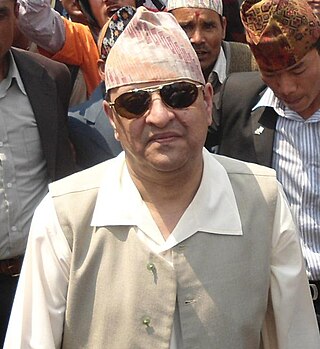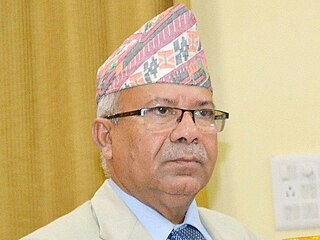| |||||
| Decades: | |||||
|---|---|---|---|---|---|
| See also: | |||||
The following lists events that happened during 2008 in Nepal .
| |||||
| Decades: | |||||
|---|---|---|---|---|---|
| See also: | |||||
The following lists events that happened during 2008 in Nepal .

Edmund Hillary - First person to reach top of Everest.

Nepal is a multi-ethnic, multiracial, multicultural, multi-religious, and multilingual country. The most spoken language is Nepali followed by several other ethnic languages.

The politics of Nepal functions within the framework of a parliamentary republic with a multi-party system. Executive power is exercised by the Prime Minister and their cabinet, while legislative power is vested in the Parliament.

Gyanendra Bir Bikram Shah Dev was the last King of Nepal, reigning from 2001 to 2008. As a child, he was briefly king from 1950 to 1951, when his grandfather, Tribhuvan, took political exile in India with the rest of his family. His second reign began after the 2001 Nepalese royal massacre. Gyanendra Shah is the first person in the history of Nepal to be king twice and the last king of the Shah dynasty of Nepal.

The Nepali Civil War was a protracted armed conflict that took place in the then Kingdom of Nepal from 1996 to 2006. It saw countrywide fighting between the Kingdom rulers and the Communist Party of Nepal (Maoist), with the latter making significant use of guerrilla warfare. The conflict began on 13 February 1996, when the CPN (Maoist) initiated an insurgency with the stated purpose of overthrowing the Nepali monarchy and establishing a people's republic; it ended with the signing of the Comprehensive Peace Accord on 21 November 2006.

Pushpa Kamal Dahal, alias Prachanda, is a Nepalese politician, currently serving as the Leader of the Opposition, since July 2024. He has served as the Prime Minister of Nepal on three separate occasions, from 2008 to 2009 as the first prime minister of the Federal Democratic Republic of Nepal, from 2016 to 2017, and again from 2022 to 2024.
Baburam Bhattarai, also known by his nom de guerre Laaldhwoj, is a Nepalese politician, architect and former Prime Minister who presently serves as leader of the Nepal Socialist Party.

The Communist Party of Nepal (Maoist Centre) (Nepali: नेपाल कम्युनिस्ट पार्टी (माओवादी केन्द्र)), abbreviated CPN (Maoist Centre) or CPN (MC), is the third largest political party in Nepal and a member party of Samajbadi Morcha. It was founded in 1994 after breaking away from the Communist Party of Nepal (Unity Centre). The party launched an armed struggle in 1996 against the Nepalese government. In 2006, the party formally joined mainstream politics after signing a peace agreement following the 2006 Nepalese revolution.

Nepal Ratna Girija Prasad Koirala, affectionately known as Girija Babu, was a Nepalese politician. He headed the Nepali Congress and served as the Prime Minister of Nepal on four occasions: from 1991 to 1994, 1998 to 1999, 2000 to 2001, and 2006 to 2008. He was the Acting Head of State of Nepal between January 2007 and July 2008 as the country transitioned from a monarchy to a republic.

Madhav Kumar Nepal, is a Nepalese politician and former Prime Minister of Nepal. He served as prime minister from 32 May 2009 to 6 February 2011.

The Shah dynasty, also known as the Shahs of Gorkha or the Royal House of Gorkha, was the ruling Chaubise Thakuri dynasty and the founder of the Gorkha Kingdom from 1559 to 1768 and later the unified Kingdom of Nepal from 1768 to 28 May 2008.

The Federal Parliament of Nepal is the bicameral federal and supreme legislature of Nepal established in 2018. It consists of the National Assembly and the House of Representatives as parallel houses.

The 2006 Democracy Movement is a name given to the political agitations against the direct rule of King Gyanendra of Nepal. The movement is also sometimes referred to as Jana Andolan II, implying it being a second phase of the 1990 revolution, also known as the Jana Andolan.

Constituent Assembly elections were held in Nepal on 10 April 2008, having been postponed from earlier dates of 7 June 2007 and 22 November 2007. The Constituent Assembly was planned to draft a new constitution and therefore decide, amongst other things, on the issue of federalism. The number of eligible voters was around 17.5 million. The Constituent Assembly was originally set to have a term of two years.

Upendra Yadav is a Nepalese politician who has twice served as Deputy Prime Minister of Nepal and also as the chairman of the People's Socialist Party, Nepal from 2020 until 2023.
Rastriya Prajatantra Party, Nepal is a Hindu right-wing, cultural conservative party. It previously existed as royalist political party in Nepal from 2006 to 2016. The party was formed as a splinter of Rastriya Prajatantra Party in 2006 and was later reunified in 2016. The party was reformed in 2022 by Kamal Thapa.

The first Nepalese Constituent Assembly was a unicameral body of 601 members that served from May 28, 2008, to May 28, 2012. It was formed as a result of the first Constituent Assembly election held on April 10, 2008. The Constituent Assembly (CA) was tasked with writing a new constitution, and acting as the interim legislature for a term of two years.

The president of Nepal is the head of state of Nepal and the commander-in-chief of the Nepalese Armed Forces.

Indirect presidential elections were held in Nepal in July 2008. The first round of voting was held on 19 July, with a run-off on 21 July. The Nepalese Constituent Assembly (CA) elected in April 2008 elected a new president and vice-president after the Fifth Amendment to the Interim Constitution was passed on 14 July. This would be the first President to be elected after Nepal became a republic a few months earlier.

Ram Baran Yadav is a Nepali politician and physician who served as the first president of Nepal from 23 July 2008 to 29 October 2015, following the declaration of republic in 2008. Previously, he served as Minister of Health from 1999 to 2001 and general secretary of the Nepali Congress.
This is a chronological timeline of events that are centered around the politics of Nepal after its unification by Prithvi Narayan Shah.